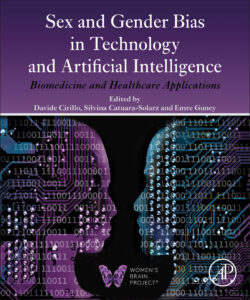The Women’s Brain Project (WBP) accomplished yet another milestone in removing barriers posed by sex and gender biases in medicine and novel technologies: The international Swiss-based non-profit organization just published their newest book, ‘Sex and Gender Bias in Technology and Artificial Intelligence: Biomedicine and Healthcare Applications’ together with the prestigious publishing house Elsevier and in collaboration with an outstanding group of international experts and initiatives including the Bioinfo4Women program of the Barcelona Supercomputing Center.
“This textbook was much needed because it collects for the very first time the state of the art in the field of artificial intelligence (AI) applied to medicine. Our book discusses both sides of the same coin: The potential of AI to recognize hidden biases on the one hand, but also its danger to perpetuate them on the other. This dilemma needs to be properly addressed, otherwise it could put achieving precision medicine as well as equitable solutions for healthcare at risk”, says Dr. Antonella Santuccione Chadha, Co-founder and pro bono Chief Executive Officer of the Women’s Brain Project, and member of the Editorial Advisory Board of the WBP Book Series.

With the aim of educating the broader scientific community on this important topic, the WBP editors Davide Cirillo, Silvina Catuara-Solarz and Emre Guney collected the knowledge of more than 30 international authors, who are leading experts in their field and hail from prestigious universities and organizations.
Innovative technologies including AI have the potential to improve the entire healthcare system for the better of patients: They enable the delivery of digital diagnostic and therapeutics and the prediction of patients’ outcomes. They provide opportunities to implement precision medicine approaches for prevention, diagnosis, prognosis, clinical decision support, delivery, and monitoring of healthcare throughout the lifespan of a patient. However, in the light of sex and gender biases, it is questionable whether this potential is being fully exploited.
WBP’s pioneering new book discusses in detail the biases and confounding factors which, when not removed from algorithm development, may perpetuate or even exacerbate existing gender inequalities.
Undeniably, AI-based technologies have the potential to enable more accurate diagnosis and treatment -but only if they are designed to detect medically relevant gender differences. The authors caution against adopting existing bias structures and poor differentiation in current medical research into AI development.
To achieve inclusiveness of all patient groups in medical research and practice, the authors have two key requirements:
- Research methods and clinical trials need to properly incorporate the socioeconomic and etiological differences in the study design and analysis.
- Models and algorithms developed for precision medicine need to take into consideration various socioeconomic circumstances, inequalities in health, age, sex, and gender differences specific to some diseases.
“It is critical that policies, regulatory measures, and spending programs ensure fairness across all patient groups. We need to avoid to unintentionally sustain or even worsen existing inequalities in health systems around the globe”, says Dr. Maria Teresa Ferretti, Co-founder and Chief Scientific Officer of the Women’s Brain Project, and member of the Editorial Advisory Board of the WBP Book Series.
The Women’s Brain Project has been pioneering this field since 2016. “We want to enable cross-functional and cross-national change toward precision medicine and sustainability, and therefore call for greater consideration of gender and sex factors in research and medical practice,” Dr. Santuccione Chadha explains. “New technologies such as AI offer an enormous potential that must be harnessed – responsibly and for the benefit of all. “



